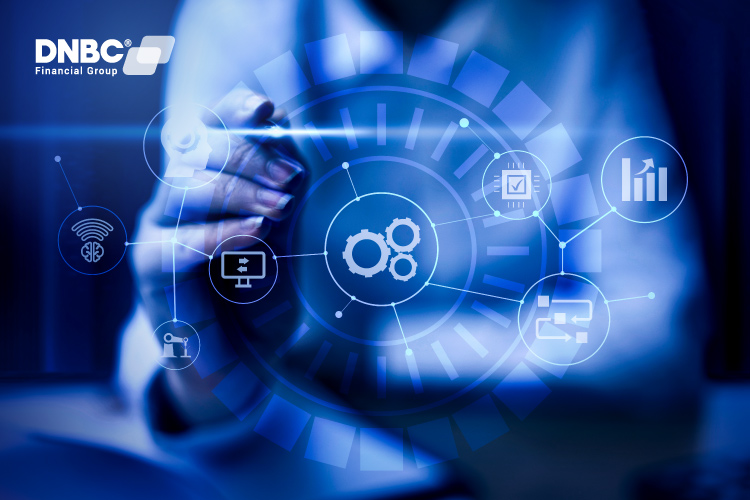The “Next Generation EU Digital Transformation” is a component of the European Commission’s overall digital transformation agenda. This effort aims to create a digitally transformed, more agile administration that supports the EU’s strategic initiatives, such as the Digital Decade and the European Green Deal.
The strategy tackles the digital transformation prospects of a post-pandemic world and aims to help the EU deliver on its strategic targets by 2030.
This article will introduce the “Next Generation EU Digital Transformation” and how businesses can strategically leverage this transformation.

The Vision for EU Commission Digital Transformation
In the quest to redefine Europe’s digital landscape, the European Commission has embarked on an ambitious digital transformation journey. This strategic move is not just about adopting new technologies; it’s about reshaping the very fabric of European society to thrive in the digital era.
EU Commission Digital Transformation
The Commission’s strategy is empowering individuals and businesses with cutting-edge technologies. Therefore, the Commission ensures that every European citizen is equipped to navigate the complexities of the digital world by fostering digital skills and innovation.
Digital Sovereignty: A Cornerstone of Europe’s Digital Strategy
Digital sovereignty stands at the core of the European Commission’s digital transformation agenda. So, strengthening cybersecurity measures and protecting citizens’ digital rights are vital priorities, reflecting the Commission’s commitment to a secure and resilient digital Europe.
Economic Revitalization Through Digitalization
The digital transformation strategy is a driving force for economic growth and competitiveness. With significant investments like the €43 billion earmarked for the Chips Act, the Commission is fueling the development of a dynamic digital economy that can compete globally.
Climate Neutrality: A Digital Pathway to 2050
The European Commission’s digital transformation strategy is intrinsically linked to its goal of achieving climate neutrality by 2050.
It is a testament to its vision of a connected and resilient Europe. The Commission is setting a global standard for digital excellence and ecological responsibility by prioritizing digital empowerment, sovereignty, economic growth, and sustainability.
Next Generation EU Digital Transformation: Embracing the Future
The “Next Generation EU Digital Transformation” is part of the European Commission’s broader digital transformation strategy. This initiative ensures a digitally transformed, more agile administration contributing to the EU’s strategic priorities, including Europe’s Digital Decade and the European Green Deal.

The strategy addresses the digital transformation opportunities of a post-pandemic world and supports delivering the EU’s strategic priorities by 2030.
The “Next Generation EU” initiative is vital to the Commission’s efforts to drive Europe’s recovery and resilience, strongly focusing on digitalization as a pivotal element for future growth and sustainability. Therefore, it aims to empower businesses and people in a human-centered, sustainable, and more prosperous digital future, setting concrete targets and objectives for 2030.
What is the Next Generation EU Digital Transformation
Reimagining its digital landscape is a lofty goal of the European Union (EU). The initiative, known as “Next Generation EU,” is not just a recovery plan but a transformative blueprint for a greener, more digital, and resilient Europe. With a staggering investment of €806.9 billion, the EU is poised to emerge more substantial, innovative, and inclusive. (Source: European Union)
The Digital Decade: A Path to 2030
The EU’s “Path to the Digital Decade” policy program is at the heart of this transformation. Therefore, it outlines specific digital targets and milestones to be achieved by 2030. Moreover, it also focuses on four critical areas: skills, business, government, and infrastructure.
As a result, this comprehensive strategy aims to boost digital skills and education. Hence, it ensures that the workforce is prepared for the technological advancements of tomorrow.
Accelerating Digital Transformation
The Next Generation EU is set to accelerate the digital transformation across the continent. By promoting the digitization of public services and the wider economy, the EU fosters an environment where innovation thrives. Major expenditures on HPC (high – performance computing), quantum computing, and cloud computing are part of this. It is essential for the EU’s economic development and strategic autonomy.
Sustainable and Inclusive Growth
The digital transition is also a cornerstone for sustainable growth. As a result, Next Generation EU prioritizes the green transition, leveraging digital technologies to fight climate change and enable a green transformation. Moreover, the initiative ensures that the digital transformation is inclusive, reducing territorial disparities and enhancing access to advanced education and training.
Consequently, the Next Generation EU’s digital transformation is a testament to the EU’s commitment to creating a future-proof, inclusive, and sustainable digital space for all its citizens. As we move towards Europe’s Digital Decade, the EU is shaping its digital future and setting a global standard for digital excellence and responsible innovation.
Unlocking Next Generation EU Funding: Digital and Green Growth
The Next Generation EU initiative is a beacon of hope for businesses across Europe. Besides, it offers a suite of funding opportunities designed to catalyze economic recovery and spearhead a digital and green revolution. So, here’s a breakdown of the specific programs and funds that businesses can tap into:
- Horizon Europe: Supports all forms of research and innovation, focusing on scientific, technological, economic, environmental, and societal impact.
- InvestEU: Provides long-term funding, attracting private investment, and supporting recovery for a greener, more digital, and resilient Europe.
- Connecting Europe Facility: Aids in developing essential energy, transport, and digital infrastructure across Europe.
- Digital Europe Programme: The first EU program aimed at accelerating the recovery and driving the digital transformation of Europe.
- European Regional Development Fund (ERDF): Strengthens EU economic, social, and territorial cohesion by correcting regional imbalances.
- Cohesion Fund (CF): Aim to reduce economic and social disparities and promote sustainable development1.
- REACT-EU: Provides additional funding for existing cohesion programs under ERDF, ESF, and FEAD.
In summary, these programs offer financial support for projects. They also align with the EU’s objectives for a sustainable and digital future. Companies can guarantee their workforce in a digital-first economy by making training and upskilling a top priority.
Leveraging EU’s Digital Transformation: A Strategic Guide for Businesses
The European Union’s digital transformation represents a monumental shift in the economic and social fabric of the continent. Businesses now have a unique chance to use digitization to drive growth and innovation as part of the ambitious Next Generation EU project.
Thus, here’s how businesses can strategically leverage this transformation:
Enhancing Digital Skills for a Competitive Edge
The EU’s goal for at least 80% of adults to have basic digital skills by 2030 is a clarion call for businesses to invest in their most valuable asset: their people. Companies can guarantee their workforce in a digital-first economy by making training and upskilling a top priority.
Adopting Advanced Technologies to Redefine Efficiency
Cloud computing, extensive data analysis, and artificial intelligence are no longer futuristic concepts but essential tools for modern businesses. Thus, the EU’s digital targets incentivize companies to integrate these technologies, thereby improving operational efficiency and carving out new business models.
Achieving Digital Intensity to Stay Ahead
More than 90% of SMEs are expected to reach a basic level of digital intensity. Therefore, businesses must assess and enhance their digital practices. Staying abreast of digital benchmarks ensures they are not left behind in the fast-paced digital economy.
Utilizing Public and Online Services for Streamlined Operations
The digitization of public services is a cornerstone of the EU’s digital transformation. Hence, businesses can capitalize on this by leveraging online services for smoother operations. It also reduces bureaucratic hurdles, and gives them more access to government contracts.
Innovating and Adapting for Future Success
In a landscape where change is the only constant, businesses must foster a culture of continuous innovation. Being agile and ready to adapt to new digital trends, pursue strategic acquisitions, or venture into new markets is critical to long-term prosperity.
Embracing the Future Finance with DNBC
The EU’s digital transformation is not just a policy initiative; it’s a gateway to a new era of business excellence. By embracing the outlined strategies, businesses can align with the EU’s vision and secure a competitive advantage in the evolving digital landscape.
Furthermore, the Next Generation EU Digital Transformation initiative emphasizes the importance of innovative financial solutions for sustainable economic growth.

DNBC’s international money transfer services offers a modern, efficient platform for global transactions. We ensure integrity and confidentiality through advanced encryption and security measures.
Moreover, DNBC’s commitment to technological innovation reshapes the financial services landscape. It drives the EU’s digital transformation agenda and propels businesses and individuals towards a prosperous future.
By embracing DNBC’s services, businesses can streamline operations, optimize liquidity management, and seize international opportunities. Besides, individuals can manage their finances across borders.
Related Articles:
- Next Generation EU Digital Transformation: Embracing the Future Finance with DNBC
- AI Revolution: DNBC Pioneering Solutions in EU Finance
- Trends in Payments and DNBC’s Role in Global Business Expansion
- Unlocking Market Entry Strategy: How DNBC Empowers Business Expansion with Confidence
- Tech Trends in Global Payments
- Facilitate European Startups with Digital Payment Trends
Or please contact DNBC
![]() Email: [email protected]
Email: [email protected]
![]() Phone Number:
Phone Number:
- +65 6572 8885 (Office)
- +1 604 227 7007 (Hotline Canada)
- +65 8442 3474 (WhatsApp)

 DNBC Team
DNBC Team